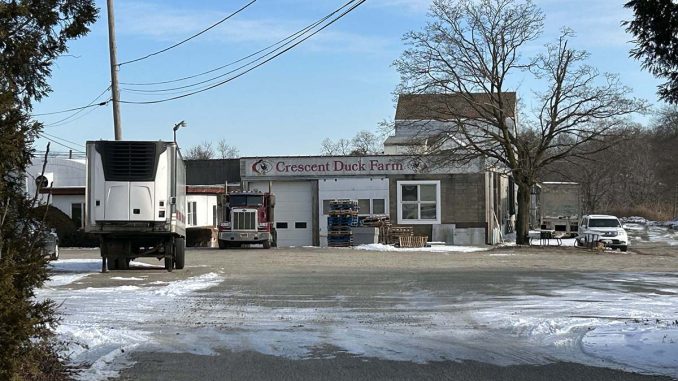
The Suffolk County health department announced that Highly Pathogenic Avian Influenza, bird flu, has been detected in a commercial poultry flock in Suffolk County.
The farm is listed on the United States Department of Agriculture’s (USDA) detection dashboard as a commercial duck meat operation with 101,000 birds. The only duck farm left on Long Island is Crescent Duck Farm in Aquebogue. The farm will now have to humanely euthanize all of the live birds in the flock.
“I’ve got a huge operation here, with an awful lot of overhead. I supply ducks to most of the better restaurants in the northeast and all across the country. The idea of going to zero and saying what the future is going to be is a hard question. I’ve lost all of my livestock,” said Doug Corwin, president of Crescent Duck Farm. “All these live birds are gone, so to say I could just snap my fingers, and start up again, it’s a phenomenal task. Impossible. Certainly it can be done over time, but I can’t tell you, while I’m in the middle of this massive operation, what the future’s going to hold.”
The infection, also known as the H5N1 virus, or bird flu, can spread to humans who are in close proximity to infected animals, but does not pass from human to human at this time, so the risk to the general public remains low. County officials said that the farm’s owners are being counseled on preventative measures such as hand washing and protective equipment to limit exposure. The county will also be testing potentially exposed workers and providing medication to those most at risk.
According to the county, the farm is currently under quarantine. The New York State Department of Agriculture and Markets and the United States Department of Agriculture Animal and Plant Health Inspection Service are also involved in the response. Both agencies are on site at the farm advising on depopulating, cleaning and disinfection activities.
This variant of H5N1 was first seen in birds in the U.S. and Canada in January 2022. The first infection of a commercial flock was reported in February of that year. Since March 2024, multiple states have confirmed H5N1 cases in cattle. On Jan. 6, 2025, the first known human death from H5N1 in the United States was reported in Louisiana.
The American veterinary medical association lists the following symptoms as possible signs of bird flu in livestock: sudden death with no prior symptoms, low energy or appetite, purple discoloration or swelling of various body parts; reduced egg production, or soft-shelled/misshapen eggs, nasal discharge, coughing or sneezing, lack of coordination and diarrhea.
To report sightings of sick or dead birds, call the New York State Department of Agriculture and Markets at 518-457-3502 for domestic poultry, or the New York State Department of Environmental Conservation at 518-478-2203 for wild birds.

